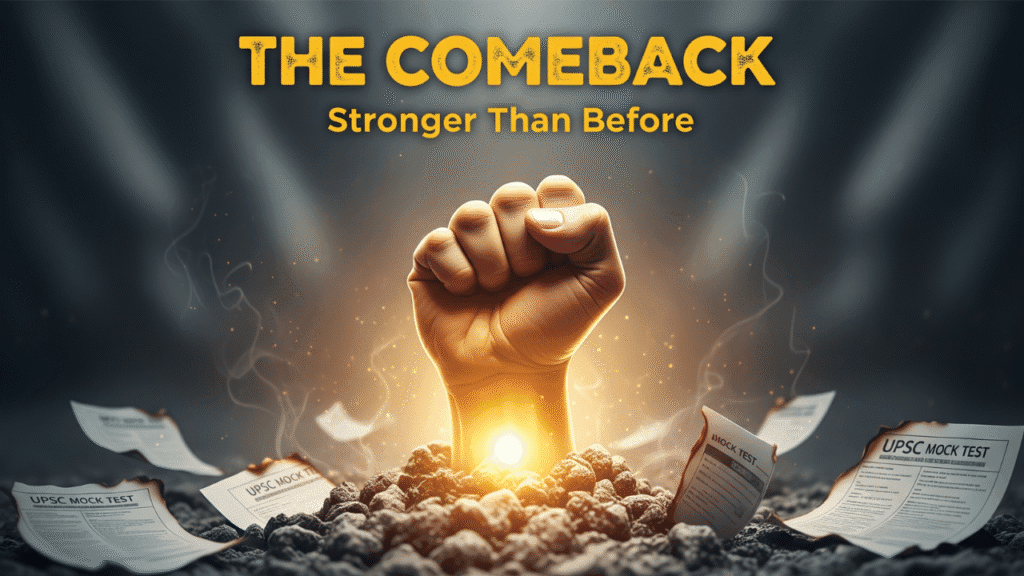
Failure isn’t the end; it’s a crossroad. This is your guide to analyzing what went wrong, rebuilding your confidence, and launching your strongest attempt yet.
The PDF is open. Your finger scrolls down the list of roll numbers, your heart pounding in your ears. And then… nothing. Your number isn’t there.
In that single, silent moment, the world collapses. The months of sacrifice, the sleepless nights, the missed family functions—it all rushes in, and the weight is unbearable. Let’s be honest: it is devastating. There is no motivational quote that can soften this blow.
But this moment of profound pain is also a moment of profound power. The journey of a civil servant is defined by resilience, and this is your first, most visceral test. This is not a guide of sympathy; this is a strategic manual for every warrior who has been knocked down and has the courage to stand up again. This is the art of the comeback.
Phase 1: The Sacred Pause (Heal Before You Strategize)
Your first instinct will be to either run away from the pain or immediately jump back into your books out of panic. Both are mistakes. Your mind is a battleground right now, and you cannot plan a war in the middle of a firefight.
You must declare a “sacred pause.” For one full week, you are forbidden from:
- Opening a single UPSC book.
- Watching any topper videos.
- Discussing strategy with anyone.
Your only job is to grieve and disconnect. Acknowledge your pain. Talk to a trusted friend or family member who will listen without giving advice. Go for long walks. Reconnect with the person you were before you became a “UPSC aspirant.” This is not a waste of time; it is a necessary medical procedure for your spirit.
Phase 2: The Forensic Audit (Become a Detective, Not a Judge)
Once the initial emotional storm has passed, it’s time to switch from being a victim to being a detective. Your goal is not to blame yourself, but to collect data with cold, objective precision.
- Analyze the Marks: Get your mark sheet. Don’t just look at the total. Where did you lose the battle? Was it the Essay? GS Papers? The Optional? The Interview?
- Identify the “Why”: For each weak area, ask why. Was it a lack of knowledge, or a lack of practice? Did you manage your time poorly in the exam hall? Did you misinterpret the questions? Were your answers too generic?
- Audit Your Sources: Were your booklists too scattered? Did you spend too much time on one subject and neglect another?
- Audit Your Practice: Be brutally honest. How many full-length mock tests did you write in an exam-like setting? How many answers did you get reviewed?
This forensic audit transforms your vague feeling of “I failed” into a concrete list of strategic problems that can be solved.
Phase 3: The Architect’s Blueprint (Rebuild Your Strategy)
Now that you have your data, it’s time to become an architect. You are not repairing the old building; you are designing a new, stronger one.
- If Knowledge was the issue: Re-evaluate your sources. Consolidate them. Fill the specific gaps you identified.
- If Practice was the issue: This is the most common problem. Your new plan must be built around a “test-centric” approach. Make mock tests and answer writing the core of your preparation, not an afterthought.
- If Your Optional was the issue: This is a tough call. If you have consistently scored low despite your best efforts, it may be time to consider a strategic change.
- If Mindset was the issue: Did exam anxiety cripple you? Your new blueprint must include time for meditation, exercise, and the mental conditioning we discussed in “The Unseen War.”
This new plan should excite you. It should feel smarter, sharper, and more efficient than your last one.
Phase 4: The Phoenix’s Fire (Reignite Your “Why”)
The motivation that drove your last attempt is gone, wounded by the result. You cannot run on those same fumes. You need a new, more powerful source of fuel.
Go back to the very beginning. Why did you start this journey? What impact do you want to create as an officer? This time, your “why” is stronger, because it is now forged in the fire of a setback. The pain of this failure will become the fuel for your comeback.
Your failure is not a verdict on your potential. It is a data point. It is the fire that burns away your weak strategies and illusions. It is the defining experience that will make you a more empathetic, resilient, and effective officer than you ever would have been without it.
The comeback is always stronger than the setback. Now, go prove it.








